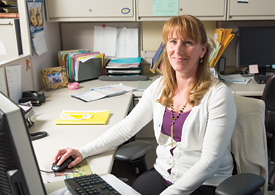Living on a small farm in Milan with animals always around, Dona Kennedy finds it hard to imagine a life without them.
“I honestly don’t know how I’ll survive the day that I can’t go and clean a horse stall. I’m that involved in horses,” says Kennedy, a school recorder-evaluator in the School of Social Work (SSW).

Photo by Austin Thomason, Michigan Photography.
Kennedy, who coached the Milan High School equestrian team for 15 years until 2009, was not always around horses.
“We lived in a suburb and my mom let us have chickens,” she said. The family eventually moved to the country, where it operated a small farm and had geese, ducks, chickens, cows, horses, pigs and goats.
“I learned about care and responsibility through my parents and being exposed to animals for the majority of my life,” says Kennedy, who competes in competitions in the American Paint Horse Association.
Responsibility has played an integral role not only in her involvement with animals but also in Kennedy’s work at U-M. As a school recorder she is responsible for many aspects of students’ records.
“Anything that involves substitutions, exemptions, permissions and special studies comes through our office, and I do the data entry for that,” says Kennedy who handles the majority of verifications of students’ records. She also works with the faculty to schedule mini-courses offered through SSW.
Working on the schedule of mini-courses has allowed Kennedy to be able to sit in on a few classes that have interested her. One was “Social Work and the Animal Human Bond,” taught by Kristine Siefert.
“The course really inspired me, and with that and adopting my dog Lily, it led me to decide what I want to do when I retire. It just all made sense,” says Kennedy. Lily, a 5-year-old French mastiff, came from a domestic violence situation.
Always having a passion for animals, it wasn’t until she was an adult that Kennedy became more exposed to the occurrences of animal abuse.
“I didn’t realize until much later in life that animals are abused and neglected and didn’t have the life that the animals on my dad’s farm had,” she says.
Realizing this, and encouraged by the work she has done to help her own dog, in the future Kennedy hopes to help rescue and rehabilitate other dogs, despite their background.
“I’m most interested in pets that come from domestic violence situations because those pets have a harder time coming out of their shell and could potentially be a hazard in another household,” says Kennedy.
Besides being dangerous for another household, Kennedy also recognizes how dogs can affect domestic violence.
“I realized that there probably are a lot of women who are in domestically violent situations and will stay just to keep their pet protected because they have no place to take them,” she says. To combat this possibility, Kennedy hopes to start a rehabilitation center where dogs can be cared for while the women seek help.
Helping to rehabilitate dogs allows Kennedy to help the animals she loves.
“I always thought that the people who love you the most would be your parents, but pets love you unconditionally. They forgive you and love you endlessly,” she says.
The weekly Spotlight features faculty and staff members at the university. To nominate a candidate, please contact the Record staff at [email protected].

